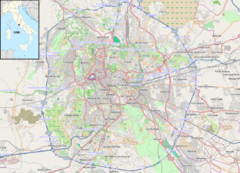Vittoriano
| Altare della Patria | |
|---|---|

The Altare della Patria.
|
|
|
Location within Rome
|
|
| Alternative names | "Monumento Nazionale a Vittorio Emanuele II" "Il Vittoriano" |
| General information | |
| Type | Monument |
| Location | Rome, Italy |
| Coordinates | 41°53′41″N 12°28′59″E / 41.894599°N 12.483092°ECoordinates: 41°53′41″N 12°28′59″E / 41.894599°N 12.483092°E |
| Construction started | 1885 |
| Completed | 1925 |
| Inaugurated | 1911 |
| Height | 70 m (230 ft) |
| Design and construction | |
| Architect | Giuseppe Sacconi |
The Altare della Patria ([alˈtaːre della ˈpaːtrja]; English: "Altar of the Fatherland"), also known as the Monumento Nazionale a Vittorio Emanuele II ("National Monument to Victor Emmanuel II") or Il Vittoriano, is a monument built in honor of Victor Emmanuel, the first king of a unified Italy, located in Rome, Italy. It occupies a site between the Piazza Venezia and the Capitoline Hill.
The eclectic structure was designed by Giuseppe Sacconi in 1885; sculpture for it was parceled out to established sculptors all over Italy, such as Leonardo Bistolfi and Angelo Zanelli. It was inaugurated in 1911 and completed in 1925.
The Vittoriano features stairways, Corinthian columns, fountains, an equestrian sculpture of Victor Emmanuel and two statues of the goddess Victoria riding on quadrigas. The structure is 135 m (443 ft) wide and 70 m (230 ft) high. If the quadrigae and winged victories are included, the height reaches 81 m (266 ft). It has a total area of 17,000 square metres.
The base of the structure houses the museum of Italian Unification. In 2007, a panoramic lift was added to the structure, allowing visitors to ride up to the roof for 360-degree views of Rome.
The monument holds the Tomb of the Unknown Soldier with an eternal flame, built under the statue of goddess Roma after World War I following an idea of General Giulio Douhet. The body of the unknown soldier was chosen on 26 October 1921 from among 11 unknown remains by Maria Bergamas, a woman from Gradisca d'Isonzo whose only child was killed during World War I. Her son's body was never recovered. The selected unknown was transferred from Aquileia, where the ceremony with Bergamas had taken place, to Rome and buried in a state funeral on 4 November 1921.
...
Wikipedia

